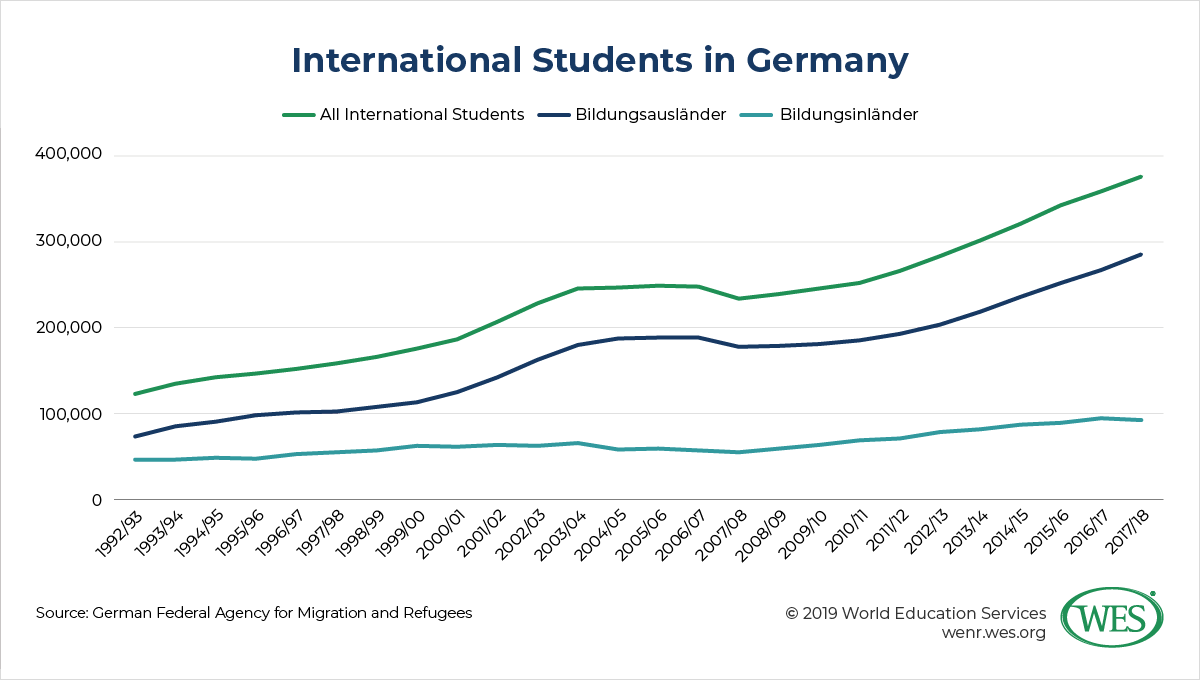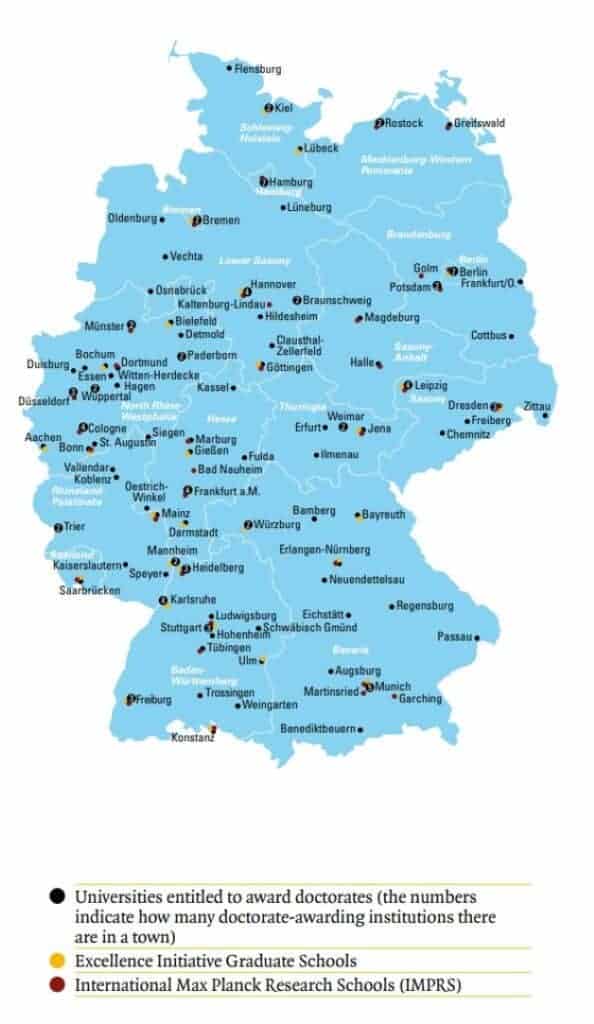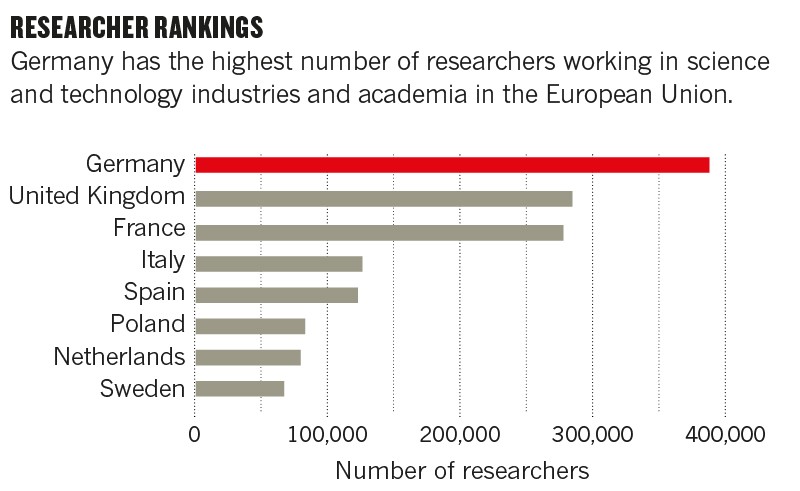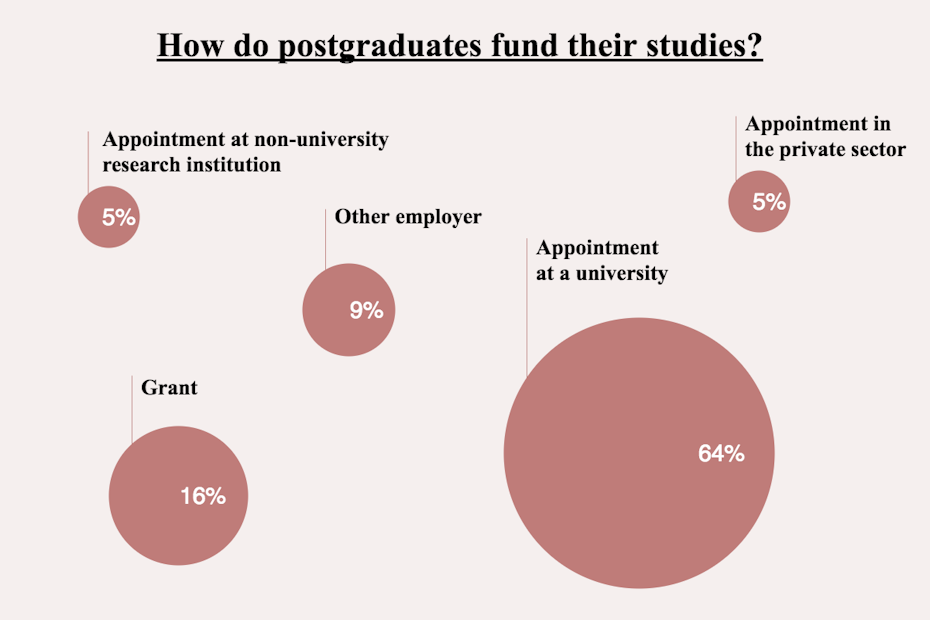Table of Contents
- 1. Best for PhD Research infrastructure
- 2. Best for Industry Experience during PhD
- 3. Best for PhD Scholarships and stipends
- 4. Best for post-PhD industry Career
- 5. Best for settling after PhD graduation
In short, Germany is the best option to do your PhD and then settle there as it offers abundant research funding for PhD students, well-structured PhD programs, PhD thesis in English, no tuition fee, low cost of living, higher chance to join the industry after PhD, work-life balance and employee-friendly policies in the industry.
Germany entice PhD aspirants around the world to study and settle by offering
- research opportunities in future technologies.
- heavy funding from the large industry sectors such as automotive, electrical and mechanical productions for research and development projects
- a long list of public and private institutions/ associations funding thousands of PhD students.
- proximity and ease in collaboration with other research labs across Europe.
- higher likelihood of Post-PhD employment opportunities in the industry.
- higher pays and low living costs as compared to other developed nations.
- best places to live and the ability to move around the whole continent on a single visa.
- amazing weather, not too cold like Canada or not too hot like Australia.

| Average PhD stipend in Germany | €24,504 per year |
| Average living cost (including rent) for students in Germany (for larger cities e.g., Berlin) | €22,956 per year |
| Average living cost (including rent) for students in Germany (for smaller cities e.g., Leipzig) | €15,516 per year |
| Average post-doc salary in Germany (work in university after PhD) | €58,014 per year |
| Average post-PhD salary in Germany (work in industry after PhD) | €66,000 per year |
1. Best for PhD Research infrastructure

Excellent support for research in Germany-German efficiency in research is cutting edge with (a) highly supportive infrastructure for research, (b) well-equipped research facilities, (c) opportunity to pursue interdisciplinary research, (d) supportive departments to (usually) supportive advisors, (e) good work conditions, (f) (usually) no obligation for PhD stipend, (g) PhD thesis in English, and (h) option to choose a structured or independent approach in your PhD studies.
Germany offers globally ranked institutions, dedicated research centers, no tuition fee, financial support, low cost of living and great work-life balance to PhD aspirants.
Highly evolved research infrastructure-In Germany there are two common approaches to PhD.
- First, an individual doctorate (usually takes 4-5 yrs), which means you are independent to choose your PhD advisor who may hire you against an interesting proposal. This allows you to explore your scientific query freely.
- Second, a structured doctorate (usually takes 3 yrs), you are hired in a group of researchers as a research associate. This path may involve structured curriculum and training in PhD. More, as a member of the research team you are expected to support efforts of all members in the bigger research goals.
| Difference | Individual Doctorate | Structured Doctorate |
|---|---|---|
| Coursework | almost no coursework | yes |
| Personal soft-skills Development | less focus | more focus |
| Supervisors | only one | usually more than one |
| Language preference | free to choose | must be in English |
| Flexibility and independence | more | less |
| Support from the academic team | less | more |
Further Reading: A few things I learned about doing a PhD in Germany by Edouard Fouché a current postdoctoral fellow in Germany.
Beyond PhD Research– Apart from pursuing your research project you can boost your skill set with professional courses like research writing, communication, and presentation. An Excellent guide to do a PhD in Germany.

2. Best for Industry Experience during PhD
Leveraging relationships between academia and industry. The German university system is composed of higher institutions research, non-university-based research, and industrial research. During PhD in Germany, you have the opportunity to really boost your career with the excellent networking that exists between German universities and non-university research organizations. The network of research institutes e.g., The Max Planck Society, Helmholtz Association, etc. is a prominent example of the reality that strong applied research is often carried out outside universities.
An applied PhD option. This means you have the opportunity to pursue projects that are industry-oriented. A PhD student in Germany is mostly recruited by the university and funded by the industry, this can give you the benefits of both worlds such as
- Industry experience -you are likely to experience industry-related and application-oriented research opportunities.
- Projecting your research to applied settings-German companies value research and are much more likely to provide you the opportunity to enhance your applied research.
- partnership experience with non-university research establishments-work on your research project in conjunction with project partners from industry.
PhD in Industry vs PhD in academia. In Germany, you have the option to choose an academic or industry focus for your PhD. In both cases, a PhD is awarded by the university, however, there can be several differences as well as their benefits attached to each type of PhD.
In an industrial PhD, (a) you have the option to work under an additional supervisor who works in the industry, (b) you have almost no coursework load, (c) you do not need to work in teaching assistantship positions as you are funded by industry to only focus on your research, (d) you focus on the problem faced by the funding company.
| Area | PhD in Academia | PhD in Industry |
|---|---|---|
| Coursework | 18 credits of coursework | almost no coursework |
| Research topic | benefits the sponsoring company | set independently by the student |
| Supervisor | academic supervisor only | second supervisor in the industry |
| Assistantship duties | teaching duties | only research duties |
| Time to graduate | longer due to coursework and duties (5 yrs), can be extended | Shorter (3-4 yrs) but no extendable |
| Post-PhD career orientation | academic research roles | Industry research roles |
Related: PhD in the industry vs. PhD in academia in Germany with Dr. Ajay Pai
“For researchers working at or graduating from German universities and technical schools, there are dozens of funding mechanisms designed to help researchers make the tricky transition from lab to market. ” Andrew Curry write at Nature.
Related: X years of Ph.D. : Should it count as Work Experience?
3. Best for PhD Scholarships and stipends

Germany offers extensive support for early career researchers. (a) First, there is no tuition fee (except little annual administrative charges) for PhD in Germany because a lot of universities are state-funded. (b) Second, there are a lot of options to fund your PhD in Germany and thousands of different bodies such as public organizations (e.g., DAAD), associations (e.g., The Max Planck Society), foundations (e.g., Alexander Von Humboldt Foundation), German industry (e.g., Federation of German Industries) support PhD scholars.
| Tuition fee | No |
| Annual administration fee | Yes |
| Education and research budget | Increase (drastically) every year |
| DAAD Funded Scholars | 145,188 (each year and increasing) |
| Triadic Patents | Highest in the world |
| Funding Difficulty for PhD | Easy if you are interested in someone’s research |
Further Reading: 4 Options for PhD in Germany (That I was not aware of!) by Mennatullah Hendawy, PhD.
PhD possible without funding (although imprudent)-Even if you are not funded for PhD you do NOT need to pay a tuition fee in Germany. This means you only have to worry about the living costs in Germany which, fortunately, are also low compared to other developed countries. However, there are hidden payments e.g., health insurance, administrative fees, etc. for a PhD scholar in Germany. That said, in most cases, a PhD student receives a salary as a research associate or a fellowship stipend.
Related: Most Asked Questions About Studying in Germany
4. Best for post-PhD industry Career
Germany is ideal for PhD graduates when considering a post-PhD industry career because
- German industry prefer PhDs. Unlike many countries where hiring managers are reluctant in taking a bet on these highly specialized workers (mostly due to stereotypes against PhDs), German firms actually prefer those with the PhD.
- Germany has a strong Economy. Germany is ranked as 4th largest economy in the world.
- Germany offers Employee benefits. There are many benefits e.g., social support, longer vacations and better work life-balance etc. to pursue an industry career in Germany. In fact, these perks in Germany overtakes what US offers to PhD graduates.
Related: How hard is it to get an industry job in Germany with my PhD?
The labor shortage in Germany of highly skilled workers. Many may say that a German PhD may be valued lesser than a PhD from UK or US, however, when it comes to the employment situation in Germany the data tells us a different story.
- More than half of mangers in German firms are PhDs, and the ratio of PhD increases further when we consider highly technical industries e.g., pharmaceuticals, chemical and natural sciences.
- A recent survey of 7500 small businesses to multi-national corporations revealed that around 66% German employers are struggling to find skilled workers.
Related: How to Stay in Germany After Your Studies
You are needed in Germany (For an industry career)-If you are an international PhD student and want to study and work in Germany the odds may be in your favor. The shortage of skilled workers in Germany is becoming more acute. Explore what kind of position you will likely get after graduating with a German PhD, especially if you want an English speaking job at
Job portals that can help you find work after PhD (for an academic career)-Although making a stable career in academia is really hard and more than half of the scientific workers report depression and anxiety or similar issues. Furthermore, early career researchers in Germany (just like many other countries) are frustrated by the precarious work contracts. Still, if you are determined to be a professor someday and lead academic research, you should perform a thorough analysis of your post-PhD academic job prospects beforehand.
Academic job prospects may change in Germany. There are increasing debates to improve the precarious situation of early career researchers as well as policy changes required for favorable academic work contracts. For instance, change in work contracts of Junior Professorship positions, habilitation, nepotism. This shows some hope for stable future academic careers in Germany.
Related: How can I remain in Germany after my doctoral studies as an eligible worker?
Here are some stats to give you an idea of academic work opportunities post-PhD in Germany.
- Curse of Temporary Contracts-Around 92% of scientific workers-under age 45-are working in temporary contracts with high workload and low compensation conditions in German academia. 78% of academics are working on fixed term contracts compared to only 8% German workers on fixed-term contracts in Industry.
- Work Permit Realities-Many Research scholars do not have an idea when they land in Germany that they only have few years to ensure permanent position in academia, after that they may not get the work permit.
- Rising Competition for Academic Jobs-PhDs numbers rise by 25% in OECD countries, however, academic job opportunities shrink further between 2014-2019.
Further Readings: Welcome to Germany—The country where most academic careers expire soon after they start
5. Best for settling after PhD graduation

Three steps to settle in Germany after PhD-As a German PhD graduate there are three stages you need to go through if you want to settle in Germany. First, you have to look for a job with your post-study work visa (usually valid up to 18 months after you graduate) Second, if you have a German PhD and you get an EU blue card which enables you to extend your stay for 2 more years. Third, spending 2 years in Germany on an EU blue card makes you eligible to apply for a permanent settlement permit.
Further Reading: Germany Post Study Work Visa: A Complete Guide
Reasons to settle in Germany after your PhD-There are many reasons to settle in Germany after graduation including (a) the increasing percentage of English speakers, (b) social benefits, (c) high quality of life, (d) lower unemployment rate, (e) relatively lower work hours, and (f) reliable public transport.
Germany welcomes skilled immigrants-Germany is in desperate need of talent and actively attracts workers who would like to take long-term employment and settle there.
Why you would like to settle in Germany and why it is best for PhD graduates to make it home, let us look at some stats and decide
- Germany ranks 22nd in the world when we consider affordability. Means the cost of living in Leipzig (Germany) is 48% cheaper than in London (United Kingdom).
- Germans life satisfaction is found to be higher than average life satisfaction around the world as per OECD (Organization for Economic Co-operation and Development)
- Germany rank 15th for expat quality of life and secured above average scores among six major categories.
Further Reading: What’s it Like to Live in Germany – the Good, Bad and the FUN
Applying to PhD positions and scholarships as international student
PhD application and scholarship application process is long in Germany. It ensures that only the best candidates can be selected for the PhD project. A good way to start is to look for a professor (with matching research interests), department, or university website for PhD application and a funding guide. You should be aware that
- it can take time to prepare your PhD application in Germany. There are 4 major steps you need to go through in order to enroll in a PhD program.
- the main part of the application will be a PhD proposal. Learn more on how to nail your PhD proposal and get accepted.
- if English is not your first language you may need to attempt some language test e.g., IELTS etc.
The good thing about PhD application process in Germany is that you can apply on your own and you do not need any third party to fill out your application forms and other documents for you. Here is an easy-to-understand guide for a German PhD application.
